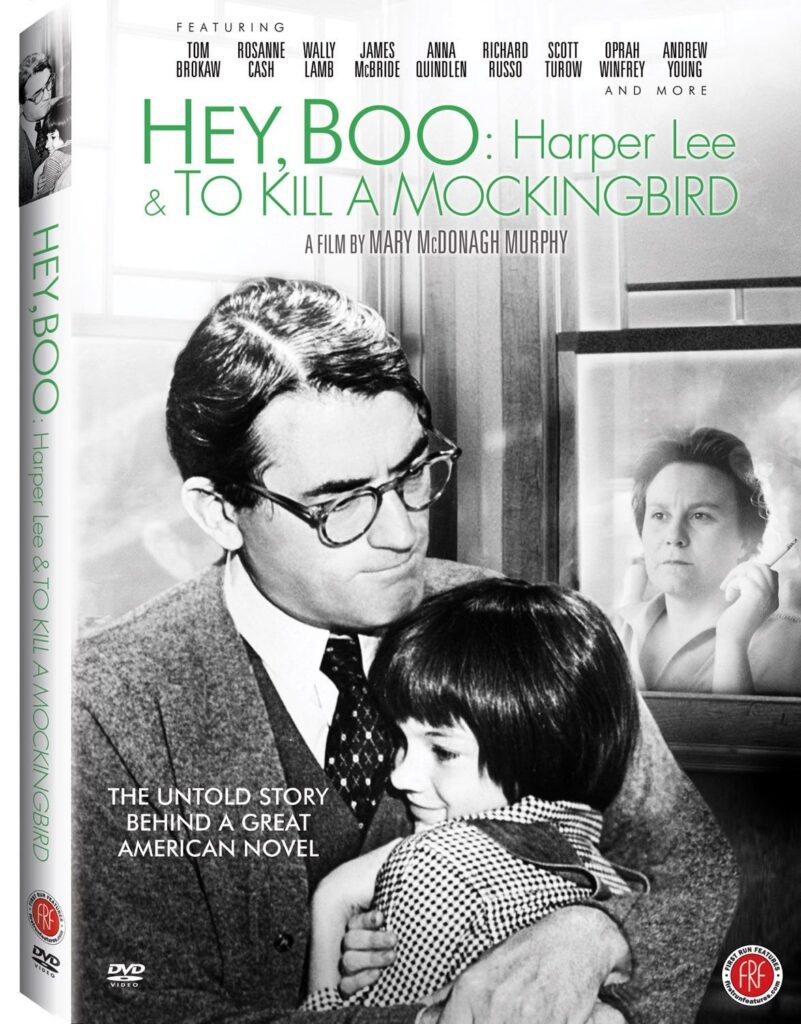
On July 19th, First Run Features releases a new documentary on “To Kill A Mockingbird” on DVD. The timing is interesting because we’re one year removed from the 50th Anniversary of the book and next year will be the 50th Anniversary of the movie. The book is an excellent portrait of a typical Deep South town in Alabama and the quirky characters that inhabit it. It’s a book about coming of age. And it just happens to have a morality tale about racism, injustice, and staying true to your values flow through the heart of the book. It’s a book that’s been read by school-age children for decades. Many people still include at the top of their favorite books.
This documentary takes a look at the author Harper Lee, the novel, and the film. The book and film occupy a very short list – one so short that I can’t think of another example – of book and film being released within a couple years of each other and both winning multiple awards. It was a long time between Lord Of The Rings and the films and even a few years passed with Harry Potter. But To Kill A Mockingbird came out while the book was still relevant on the charts.
The documentary is pretty flawless. The story unfolds with the history of Harper Lee and the publication of the book, through its initial success and then onto the casting and triumph of the film. The documentary finishes with a summary of the main characters and how they fit into Harper Lee’s life. What director Mary McDonagh Murphy has learned from great storytellers like Ken Burns is to let other people tell the story instead of a narrator. So to transition scenes and break up long narratives of biography – stars like Tom Brokaw, Anna Quindlen, Rosanne Cash, and the great Oprah Winfrey talk about the book and the influence it had on their lives.
The film does address some touchy questions – some with humor and some in more serious detail. There has been the rumor that Truman Capote helped her write much of the novel. That was refuted by people who had seen the galleys long before the two met to talk about the book. There have been lots of questions as to why Lee hasn’t written another novel since then. That’s also addressed in more practical ways. I like the portrait of Lee as a simple woman that wrote the best novel she could and doesn’t see a reason to try to top it.
The most interesting interview of the film is that with Lee’s older sister – Alice Finch Lee. Yes, older! She’s in her late 90s and has a voice that may break your in-home speaker system. But she provides some great insights into the mysterious Lee and especially her youth that shaped the way she wrote.
Breaking down the characters is helpful and could have been used as a frame to tell the remaining portions of the story of the book and movie. Speaking of Atticus leads to discussions of racism and the early ’60s. As they pointed out, it’s easy to forget that this book predates almost all of the important events of the Civil Rights era of the ’60s. Scout is Harper Lee and she’s a hero to women still today. Her aggressive approach to life still reads as very refreshing. Lee is viewing this town through Scout’s eyes and using her voice to tell the story of the type of town she grew up in. And Dill is Truman Capote. Their relationship is certainly addressed but there’s a depth there that is only hinted at. Dill’s temporary summer relationship with Scout presages Truman’s jealousy over the awards that she won that he wouldn’t win for In Cold Blood.
The narrators read their favorite lines from the novel as the movie comes to a close. It’s Oprah that provides the seminal moment of the film and gives the film its main title. Her voice is wonderful and I wish she’d take a break and do some books on tape. Oprah speaks of Scout and her insight into Boo Radley. In her reading we see how beautifully Harper Lee captures very tiny and small moments but the way they can tell us everything we need to know about the character. As Scout passes and says, “Hey, Boo,” it shows the warmth and understanding in her heart.
It’s interesting to watch a standalone documentary about a book and movie. It’s got the feel of something that we might find as a Bonus Feature on the 50th Anniversary Blu-ray of “To Kill A Mockingbird”. And yet it’s about more than just the film. I think what I come away missing is more of the context of the story as it relates to the South in 1960. The book is read by thousands of high school children every year. This would make a great companion piece to that reading. The bonus interviews on the disc with Oprah, James McBride, Mary Badham, and the director lead me to believe that people want to talk more about this book and film. An expanded film could make a great teaching piece. It’s one of the most important works by an American in the past half century and the more we talk about the themes of the book, the better place we’re creating for our future.